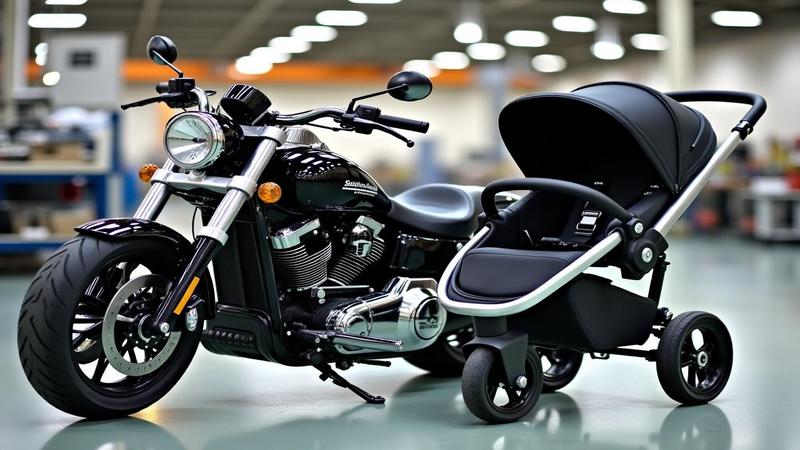Trump Expands Tariffs to Target Baby Gear and Motorcycles

President Trump announced a broader swing of metal tariffs Monday, this time aimed at baby gear and motorcycles. Officials said the move would level the playing field by taxing the tools families use to push strollers and kick start hobby bike dreams. Markets responded with astonishment and a shrug that said this is normal in Washington.
Trade policy experts argued that adding metal tariffs to consumer products is like guarding a cookie jar with a moat and discovering the cookies are in another jar across town. The tariffs apply to a catalog of items that includes children’s car seats, bottle racks, and sport bikes, all supposedly forged in a metal driven economy. Retailers immediately began rebranding price tags with new metallic styling.
Manufacturers suspended production lines to assess costs, while supply chain consultants held emergency stand up meetings in coffee shops. Bankers whispered about the possibility that tariffs would raise prices on little things that make big people feel powerful such as toy motorcycles and chrome push bars. The White House insisted this would ultimately boost American jobs, or at least create enough paperwork to keep lawyers employed.
Economists asked if taxing a toy gun is policy or a statement about national security. The tariffs cover metals used in widely available consumer goods from stroller frames to engine covers, officials clarified with a straight face. The public perceived this as a new episode of a reality show where the plot twist is a fifteen percent price increase on anything with a shiny finish.
Consumer advocates warned about ripple effects on the toy aisle and the motorcycle parts counter. Parents dreaded new sticker prices for high chairs and helmet visors, while bikers calculated how many extra weekends of riding they could squeeze out of a single tank of optimism. The administration shrugged and invited everyone to buy American brand optimism, preferably while wearing a hard hat.
The tariff announcement was framed as rebalancing the trade imbalance, a phrase that has become a hobby for economists with slide decks. Critics labeled it a political performance art piece in which policy clings to headlines like chrome on a bicycle. Supporters argued that even if prices go up, patriotic feelings rise higher mostly in charts nobody understands.
Labor unions signaled they would watch the policy closely, ready to negotiate on issues of car seat hardware and metal alloy shortages. Opponents threatened lawsuits and a flood of press releases. The administration promised more details in coming days, which is political code for we ran out of reheated talking points.
Officials insisted the plan was meticulously targeted, combining tariffs with a promise to defend domestic metal industries. Meanwhile, consumers began browsing with resignation and curiosity for alternatives, including the impulse purchase of a ‘ultra-plush stroller’ that would make any bump feel like a cushion orbiting a cloud.
Analysts warned the ripple effects could boomerang into higher prices on baby gear and bikes, while some supply lines shifted to humorous loopholes. Businesses urged shoppers to consider a one stop shopping strategy as they hunted for a ‘ergonomic baby carrier’ in the confusion.
Meanwhile headline writers at major outlets are revising policy narratives as if from a betting pool. The policy rationale remains vague, mostly repeating that tariffs exist to coax other countries into more fair trade terms, a concept that even the most optimistic policy wonks describe as a vibe.
On the factory floor, managers measured every bolt twice and announced that nothing is sacred when tariffs meet chrome. Some plants reportedly repurposed production lines to craft decorative metal signs instead of actual baby gear, hoping fashion can subsidize the costs.

Shop owners braced for sticker shock and deeper confusion, as price labels became cryptic and made in labels turned into tiny philosophical debates.
Congressional committees scheduled hearings that will likely be attended by a handful of lobbyists and a confused intern.
Officials insisted exemptions would apply to essential metal components, though baby gear frequently uses a surprising amount of essential components.
Some economists warned that tariffs on consumer goods risk turning ordinary households into impromptu think tanks, arguing about supply chain fractals while groceries go up in price.
Parents meanwhile discovered a new hobby calculating the true cost of a giggle per mile, which somehow translates into bike maintenance costs.
Politically the move is a reminder that policy often arrives with dramatic fanfare and a shorter shelf life than a fresh loaf of bread.
Analysts pointed out that tariff expansion might benefit domestic metal mills at the expense of the average shopper.
Industry groups expressed mixed feelings, praising the defense of American craftsmanship while panicking about helmet prices and bike accessories.
Retailers launched new ad campaigns promising metallic shine and budget friendly options, which is a rare combination in political messaging.
By the end of the week the policy had become a test of patience for anyone trying to buy a stroller and a motorcycle without opening a price forecast app.
Whether this policy will endure or vanish like a well polished chrome bumper remains to be seen, but one thing is certain: the marketplace now has more headlines than a national weather report.
